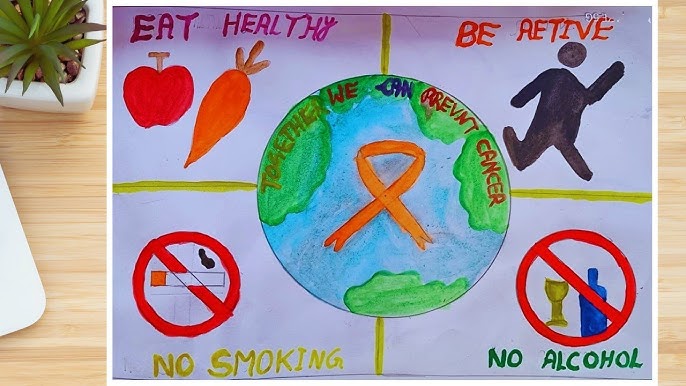Cancer is a word that can cause fear, worry, and sadness. But here’s something powerful to remember—many types of cancer can be prevented. By making smart choices every day, you can reduce your risk and protect your health.
This post will walk you through simple, proven, and practical cancer prevention tips. You don’t need to change your entire life overnight. Just a few small, consistent habits can make a huge difference over time.
🎯 Need to Focus on Prevention
Cancer is one of the leading causes of death worldwide. But research shows that more than 30%–50% of cancer cases can be prevented through lifestyle and behavior changes.
The earlier you start, the better your chances of avoiding serious health problems later in life. Prevention is not just about avoiding disease—it’s about creating a life that feels strong, energized, and joyful.
🍏 1. Eat a Healthy, Balanced Diet
Your food choices play a big role in your cancer risk. A healthy diet supports your immune system, reduces inflammation, and helps your body fight off harmful changes in cells.
Eat more of these:
- Fruits and vegetables (especially colorful ones)
- Whole grains (brown rice, oats, quinoa)
- Legumes (beans, lentils, peas)
- Healthy fats (nuts, seeds, avocados, olive oil)
- Lean proteins (fish, chicken, tofu)
Limit these:
- Processed meats (like bacon, hot dogs, deli meat)
- Red meat in large amounts
- Sugary snacks and drinks
- Deep-fried or heavily processed foods
Bonus Tip: Include cancer-fighting foods like broccoli, berries, garlic, turmeric, and green tea in your meals.
🚭 2. Don’t Smoke or Use Tobacco
This one’s simple—tobacco is the leading cause of cancer and cancer deaths worldwide. Smoking is linked to cancers of the lungs, mouth, throat, bladder, kidney, cervix, and more.
Quitting isn’t easy, but it’s possible. Every day without tobacco lowers your cancer risk.
Need help?
- Join a quit-smoking program
- Talk to your doctor about medications or nicotine patches
- Reach out for support from friends and family
🍷 3. No Alcohol
Alcohol increases your risk of several cancers, including breast, liver, mouth, throat, and colon. The more you drink, the higher the risk. Some experts say no alcohol is best when it comes to cancer prevention.
🧴 4. Protect Your Skin from the Sun
Skin cancer is one of the most common—and one of the most preventable—types of cancer.
Smart sun habits:
- Use sunscreen with SPF 30 or higher every day
- Reapply every 2 hours if outdoors
- Wear hats, sunglasses, and protective clothing
- Stay in the shade between 10 AM and 4 PM
- Avoid tanning beds completely
Check your skin regularly for unusual moles or spots and see a dermatologist for yearly checkups.
🏃 5. Stay Physically Active
Exercise helps you stay at a healthy weight, boosts your immune system, and lowers the risk of many cancers—including breast, colon, and endometrial cancer.
How much to move:
- At least 30 minutes of moderate activity (like walking) 5 days a week
- Or 75 minutes of strength activity (like running) weekly
Every bit counts! Walk instead of drive. Take the stairs. Dance at home. Just move more.
⚖️ 6. Maintain a Healthy Weight
Being overweight or obese is linked to at least 13 types of cancer, including breast, colon, kidney, and pancreatic cancer.
Tips to manage weight:
- Eat nutrient-rich, low-calorie foods
- Drink more water, not soda
- Get regular physical activity
- Watch portion sizes
- Limit late-night snacking
Focus on progress, not perfection. Even losing a small amount of weight can improve your health.
💉 7. Get Vaccinated
Some vaccines can actually protect you from cancer-causing viruses.
Important cancer-prevention vaccines:
- HPV vaccine – protects against human papillomavirus, which causes cervical, anal, and other cancers
- Hepatitis B vaccine – helps prevent liver cancer
Ask your doctor if you or your children need these vaccines. Prevention can start early.
🧪 8. Get Regular Screenings and Check-Ups
Screenings help catch cancer early—when it’s most treatable. Some screenings can even prevent cancer from developing.
Common cancer screenings:
- Mammogram (breast cancer)
- Pap test and HPV test (cervical cancer)
- Colonoscopy (colon cancer)
- Low-dose CT scan (lung cancer in smokers)
- Prostate exam (prostate cancer)
Talk to your doctor about what screenings are right for your age, gender, and risk factors.
😴 9. Get Enough Rest and Manage Stress
Chronic stress and poor sleep don’t directly cause cancer, but they weaken your immune system and encourage unhealthy habits like overeating, drinking, or smoking.
Sleep tips:
- Stick to a regular sleep routine
- Avoid caffeine late in the day
- Keep your bedroom cool and quiet
Stress tips:
- Try deep breathing, meditation, or journaling
- Stay connected with positive people
- Spend time in nature
- Laugh more—it’s good medicine
🧼 10. Reduce Exposure to Harmful Chemicals
Some chemicals in the environment may increase cancer risk.
Things to avoid or limit:
- Pesticides and herbicides (use gloves and follow safety instructions)
- Radon gas in homes (get your home tested)
- BPA in plastics (use glass or BPA-free containers)
- Asbestos in older buildings
- Smoke, fumes, or industrial chemicals if you work in those settings
Tip: Choose natural cleaning and personal care products when possible.
👪 11. Know Your Family History
Some cancers run in families. If close relatives had cancer—especially at a young age—your risk may be higher.
What you can do:
- Share your family medical history with your doctor
- Ask if you need earlier or more frequent screenings
- Consider genetic counseling if you have a strong family history
✅ Daily Cancer Prevention Checklist
Here’s a simple checklist you can follow to build a cancer-smart lifestyle:
✔️ Eat fruits and vegetables
✔️ Move your body daily
✔️ Don’t smoke
✔️ Limit alcohol
✔️ Wear sunscreen
✔️ Maintain a healthy weight
✔️ Get your vaccines
✔️ Go for regular screenings
✔️ Sleep well
✔️ Manage stress
✔️ Avoid toxic chemicals
✔️ Know your family history
💡 Final Thoughts: Prevention is Power
You have more control over your health than you think. Each healthy choice is like a shield protecting your body. It’s never too late to start making changes—and every step counts.
You don’t need to be perfect. Just be consistent. Start with one small change today. Then build on it. Over time, these habits could save your life—or the life of someone you love.
Your body is your home. Take care of it. It’s the only one you’ve got.





